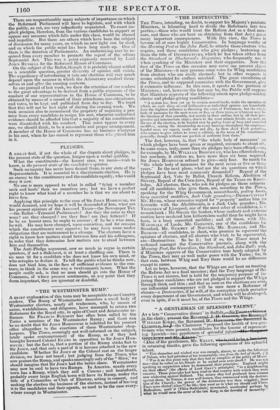PLEDGES.
A GREAT deal, if not the whole of the dispute about pledges, in the present state of the question, hinges upon a verbal quibble.
What the constituents—the honest ones, we mean—wish to know, is the present state of the candidates opinion. Such an inquiry has never been denied them, in any state of the Representation. It is essential to a discriminate election. He is an enemy to the constituency and the candidate equally, who would deny it now.
No one is more opposed to what is called "tying a member neck and heels" than we ourselves are; but we have a perfect right to know what kind of a member he is that we are about to leave free.
Applying this principle to the ease of Sir Jonx Honisouss, we would demand, and we hope it will be demanded of him, what are his present opinions of the Assessed Taxes—the Newspaper Tax .—the Ballot—Triennial Parliaments? Are thew the same as they were? are they changed ? arc they free ? are 'they fettered? if be be an honest man, he ought to answer ; if he be a wise man, be will. He may have changed, upon conviction, and for reasons which the constituency may approve: he may have come under obligations that are tantamount to a change. The electors have a right to know how matters stand between him and his colleagues, in order that they determine how matters are to stand between him and themselves.
The Anti-Pledge argument, now so much in vogue in certain quarters, if not a dishonest, is at least a shuffling one. There is no man fit for a candidate who does not know his own mind, or who scruples to declare it. To tell the public what he thinks now, does not bind him, in the face of sufficient evidence to the contrary, to think in the same way a twelvemonth hence. What the people really ask, is that no man should go into the House of Commons, of whose present sentiments, on any point that they deem important, they are ignorant or doubtful.


























 Previous page
Previous page